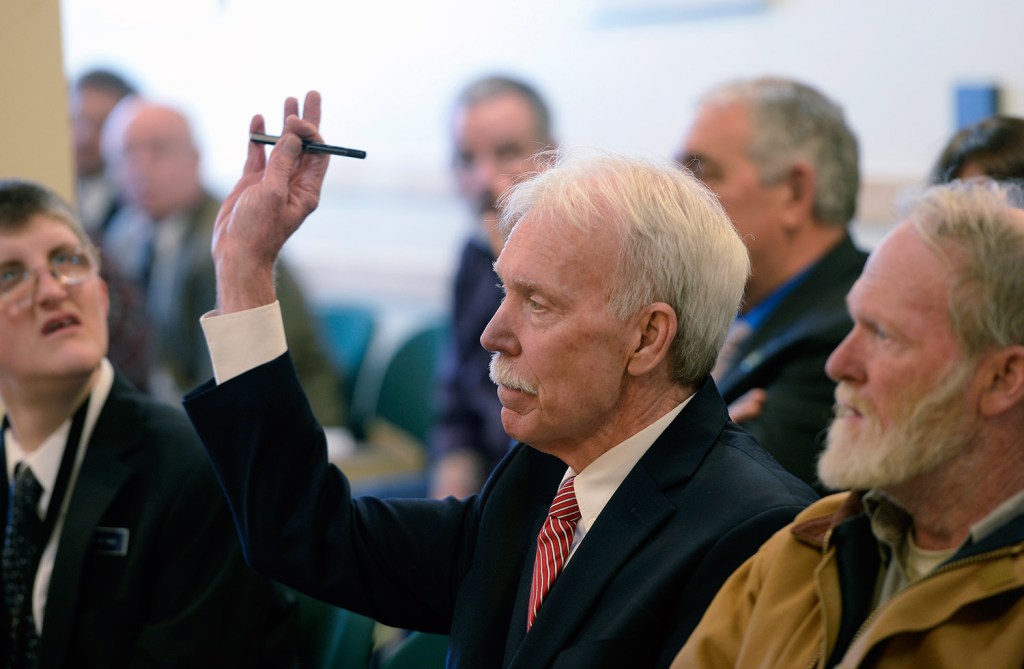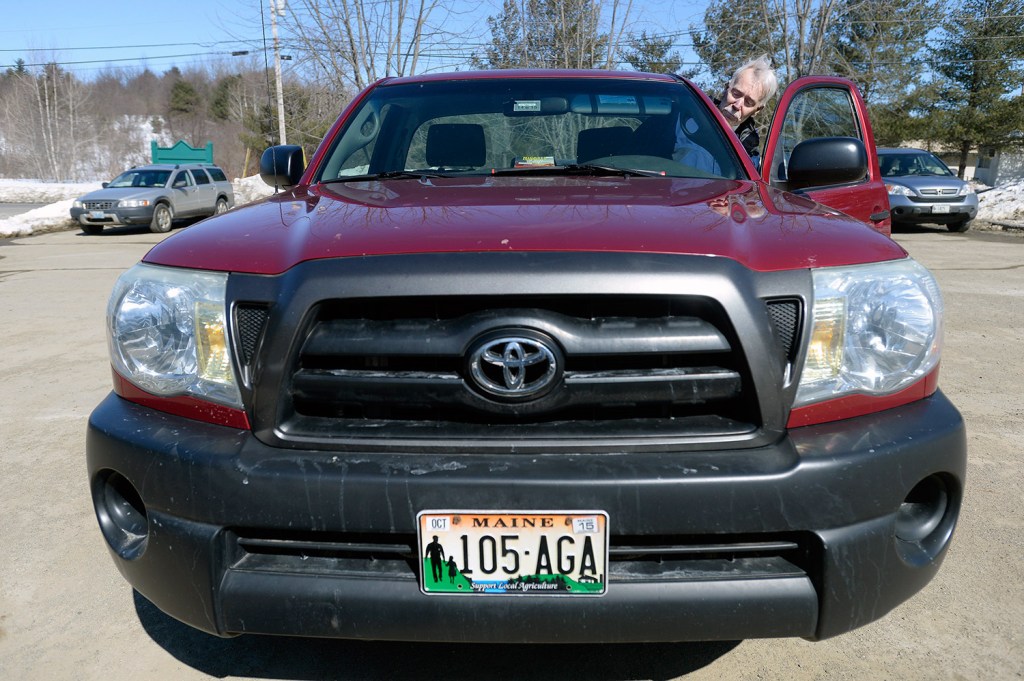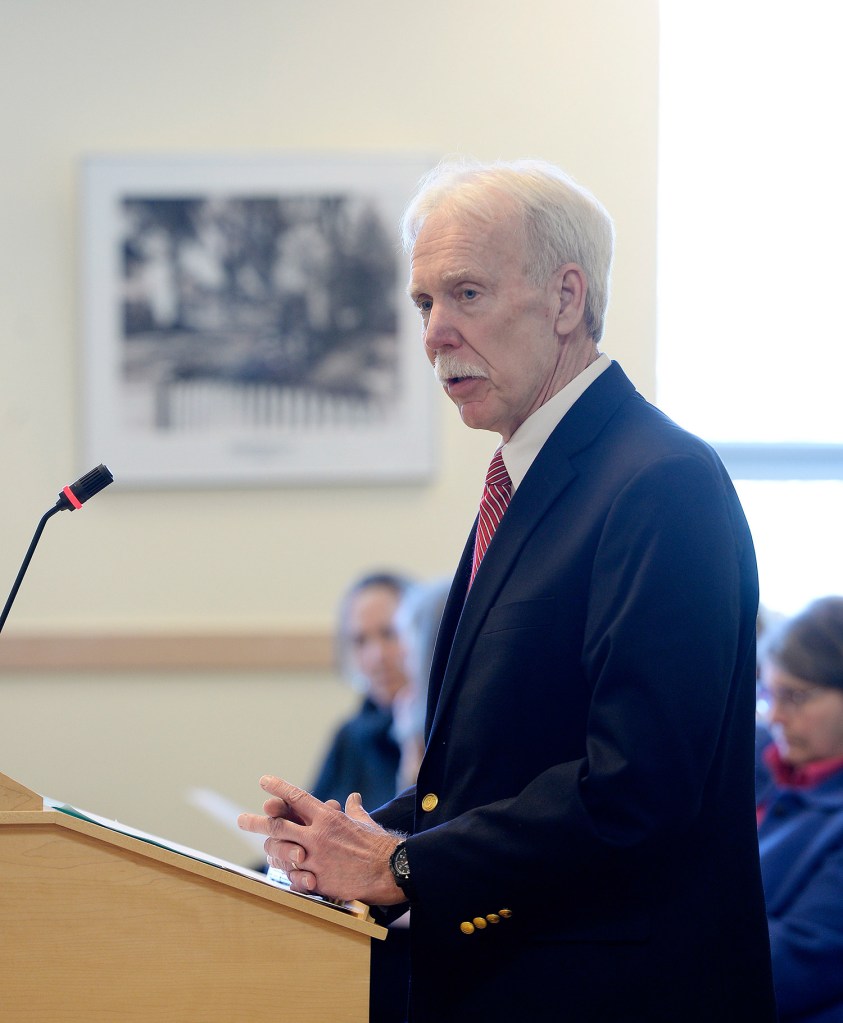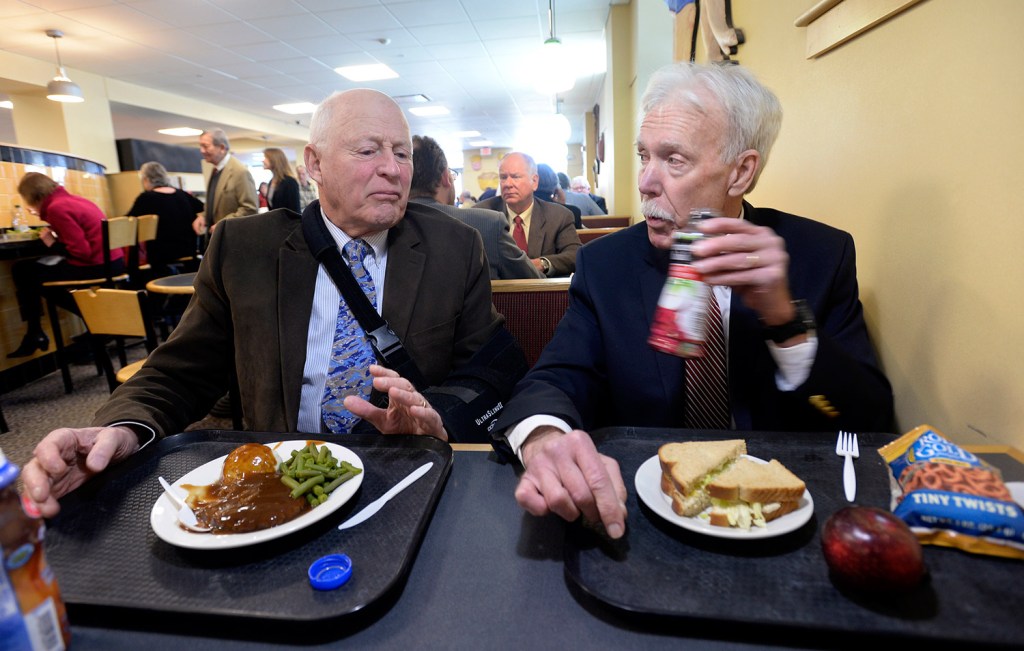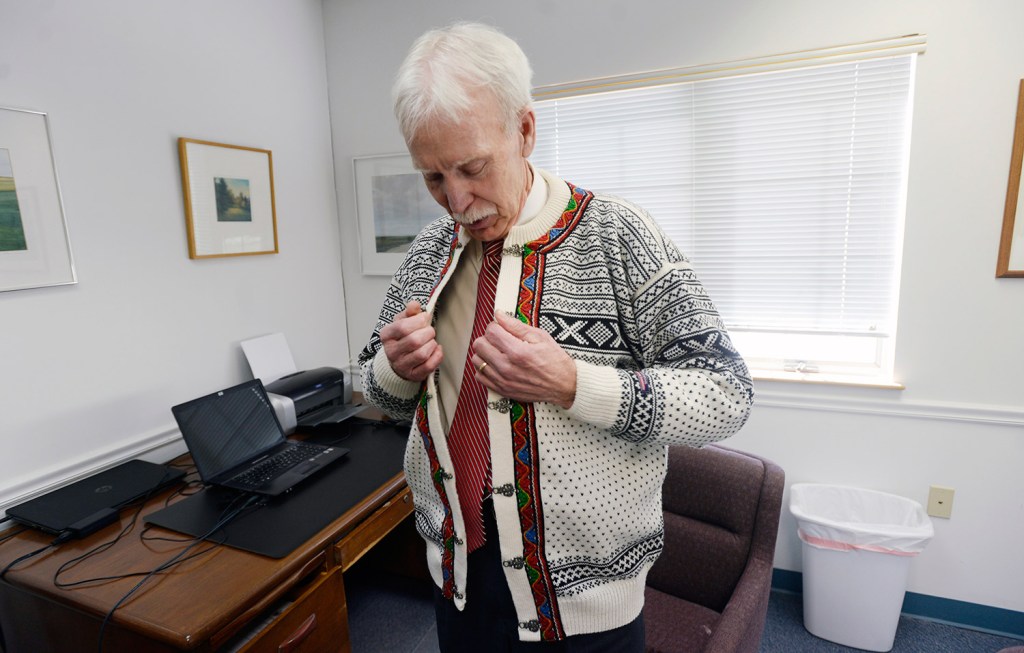What Jon Olson would like to do when he retires in June after 35 years at the Maine Farm Bureau, all but one of them as the executive secretary and main lobbyist for the agricultural group, is to quietly slip out the back door. No party, no fanfare, just a dignified retreat at a time he has deemed just right for departure.
Good luck with that. Those who have crossed his path during his tenure at Farm Bureau are loath to let him sneak away uncelebrated.
“If we have any way of not letting that happen…” said Wendy Pieh, cashmere goat farmer and former legislator. “He’s respectful of everyone. I’ve never heard him say a negative word. He’s just dynamite.”
“I love Jon Olson,” said Marge Kilkelly, also a longtime former legislator and now senior policy advisor to Sen. Angus King. “His position and the respect people have for him has been polished as opposed to tarnished over the years, and that is pretty amazing for anyone.”
The goodwill extends well beyond people who tended to be on his, or rather, Farm Bureau’s side of the fence.
“He is an extraordinary person who brings people together,” said Chris Hamilton, associate director of the Maine Organic Farmers and Gardeners Association (MOFGA).
“We have often been on the opposite sides of issues,” Hamilton said. MOFGA, as old as it is, is nonetheless more new school Maine farming while Farm Bureau represents the old guard. Nonetheless, they regularly sit shoulder to shoulder in committee hearings. “And he’ll get up to testify, and then I will get up and testify and say just the opposite, but we will still sit together and enjoy having lunch together.”
How did Jon Olson get to be the most appreciated and respected lobbyist in Augusta?
SWEET SUGARLOAF
The story starts on a chairlift in Vermont. It’s 1970. Jon Olson, Iowa farm boy, has recently returned from a two-year stint in the Peace Corps in Sierra Leone. He taught general sciences and biology in a secondary school. At this point in his life, he has his college degree, from St. Olaf in Minnesota, but no real idea what to do with it. He does know he likes mountains, which Iowa does not have, and he likes skiing.
But apologies to the Green Mountain State and Killington’s lovely slopes, neither were quite to his liking. “It was really crowded,” Olson remembers. While riding the chairlift with a stranger, he asked, “Where is a great place to ski where I can be close to nature but not a lot of people?” His companion recommended Sugarloaf.
And there, at Sugarloaf he rode another chairlift and struck up another conversation, this time with a young woman named Alice who had just graduated from Colby College. He admired her skiing. She asked him questions and he gave her one-word answers in the manner of his Norwegian father, who immigrated to the United States at age 14, by himself, and never shared the story of what it was like to face a whole new world alone.
“Finally she said, ‘How am I ever going to get to know you? You don’t talk.'” Olson remembered.
He nearly blew it with his answer: “I don’t want to talk,” he said he told her. “I just want to ski.”
“Then it dawned on me that I should really talk to her because she was a good skier, and I had a lot of fun with her.”
For three years they remained just friends and skiing companions. He’s a patient, careful man. Life at Sugarloaf was good. Olson skied by day and washed dishes morning and evenings at Chateau des Tagues. They fed him there – and well (chef Clem Begin would go on to win friends and influence people himself, becoming a major developer of the Sugarloaf area). Olson was a carpenter in the summer, and back on the slopes in winter. So a ski bum then, yes?
“I was, yes,” he said easily. His ambitions were simple.
“Maine was so beautiful. It had the mountains, and the people were so friendly. And then, I liked Alice. So there are the three reasons I stayed.”
TWO BIG LEAPS
When he and Alice made the leap, it was forever. Their lives were sweet – when she was pregnant with their first of two sons, Nels, they vowed they wouldn’t let a baby interfere with skiing priorities, taking him for a cross-country ski on the lake in Mount Vernon on the very day they brought him home from the hospital. Alice, who has had a long career as a second-grade teacher, strapped the baby on and off they went. “She’s pretty amazing,” Olson said.
But by the late 1970s, Olson was starting to wonder what else he should do with his life. At church he met another parishioner who was the executive secretary of Maine Farm Bureau. Olson mentioned he was thinking he should use his education for something more than being a carpenter. It seemed Farm Bureau was looking for a program coordinator; the duties included visiting farmers and talking to them about Farm Bureau activities. Olson had grown up on that farm in Iowa, with cows and pigs and corn and soybeans. He could talk to these people. He took the entry-level job.
A year later, the executive secretary moved on to the American Farm Bureau, and Olson stepped into his shoes.
Nervously. And not sure he was wearing the right shoes. Or suit.
“I was really green back then,” Olson said. “I thought you had to be a kind of power broker to be a lobbyist, with power suits and that type of thing. Or you had to contribute a lot of money to federal candidates. Or maybe you really needed to be an elegant speaker and just sweep people off their feet.”
Which, if you remember the chairlift, is not Olson’s style. At a conference he received the lesson that defined his career from a member of the Pennsylvania assembly. The politician told attendees that the key to being successful at lobbying was to tell the truth. “I thought to myself, well, I can do this,” Olson said. And he did, with nary a power suit in sight. (His sartorial choices run more to blue blazers at the State House and Nordic sweaters in the office.)
Some career highlights include the successful battle to allow an exemption to the state’s anti-billboard legislation for farmers selling from farm stands and the sales tax exemption for equipment purchased for use on commercial farms. The hay wars, which Marge Kilkelly worked on with him, eliminated a confusing tax imposed on hay for horses but not for cows because the former were considered pets. In 2006, the Farm Bureau lobbied on behalf of an farm-themed license plate (which raises money for agricultural education). Olson was first in line for one. He asked for 105 Ag. “They started with 101 Ag, but I didn’t want to take the license plate from the legislators,” he said.
His daily duties include reading over the hundreds, even thousands of bills proposed in a legislative session, seeing if and how they affect Maine farms, agriculture or rural life, then working with the membership to see what position farmers want to take on the ones that do. Usually that’s about 100 bills. He testifies himself where needed but mostly, he says, he rallies the forces to come speak to legislators.
“That’s the strength of our organization,” he said. “Not me giving testimony.” Just this month Lisa Turner from Laughing Stock Farm in Freeport came to speak on behalf of raw milk regulation. So did cheesemaker Alison Leary. “When you have a person like Alison speak, it makes an impact,” Olson said. “She’s not paid. In fact, she’s losing money being there. She speaks from the heart.”
But as Wendy Pieh tells it, so does Olson, whose habitual truth telling is not standard lobbyist style, after all. As a rule, she avoided lobbyists. “They may tell the truth, but they omit things,” Pieh said. “Because there are also the truths that might not work for them.”
But sometimes you do need someone to fill you in on a bill. That’s when she’d turn to Olson. “You could be completely confident that he would be telling you what it was really about,” she said. “Always thorough, always circumspect, very accurate in what he was saying.”
Without mincing words. At a hearing March 19 on proposed legislation on the health and welfare of laying hens, including the size of their cages, Olson delivered his testimony against “An Act To Ensure Humane Conditions for Egg-laying Poultry” in about three minutes, at least twice as fast most the rest of the speakers. Maine’s poultry is already well protected under the law, he said. “Bad bill,” he’d told his friend Bill Bell, executive director of the New England Brown Egg Council, at lunch in the State House cafeteria, where he bumped into someone he knew roughly every 30 seconds.
Or someone who thought they knew him. Olson is often mistaken for another popular figure in Maine politics, U.S. Sen. Angus King. When King was governor, Olson fielded requests for autographs from schoolchildren visiting the State House. And the two men have joked about doppelgänger Olson subbing in for the senator at parades.
CHANGING LANDSCAPE
The Maine farming landscape has changed considerably in the Olson era. The price of doing business has risen across the board – putting many dairy farms out of business – and the average age of farmers is creeping toward 60. At the same time, more young farmers are taking to the land, and the organic movement continues to gain strength. Farmers markets are everywhere, and the emphasis on local food has never been more intense.
“It’s the greatest shift since the 1940s,” Kilkelly said. “Those shifts are never easy. Jon has done well to thread the needle with Farm Bureau in terms of how do you keep the people who have always been members, keep them satisfied, and at the same time looking at new opportunities for the organization as a whole.”
But it has been a challenge recruiting these younger farmers, Olson said, worrisome because the $75 annual membership fee keeps Farm Bureau afloat. One of the 45 applicants for his job may have a different approach. Maybe beef up the Farm Bureau Facebook presence and take to Twitter more often. The skills Olson brought with him at 35, like letter writing, are less crucial now. “Communication has changed now,” he said. “I’m very lacking.”
But he remains confident in the organization he’s leaving.
“The people that are just farming for the first time don’t understand the need for Farm Bureau,” Olson said. “But they will.”
He’s 70 but technically not retiring. He’s just moving onto his weekend gig.
“I tell people I am bi-vocational,” Olson jokes. “During the week I help farmers feed bodies and on the weekends, I help the Almighty feed souls.”
At a time when some trade in cars or wives or boats, Olson felt a calling. He went to Bangor Theological Seminary, taking classes whenever he could, and 10 years ago, received a master’s degree in divinity. Now he has a ministry of his own, at the North Wayne Church, where his congregation is very much in need of a good listener. “A lot of people who are alone,” he said, describing his flock. “There are elderly women and men, living by themselves, so I visit with them. They have stories. Especially the widowers. There are these men that are by themselves and people think they are crotchety. But if you just ask them their stories about meeting their wives, they just brighten up.”
Before he gets to listen to more of those stories, he has to go through the embarrassment of being told by people, every day, how much he’ll be missed in Augusta and how hard it will be to replace him.
“It’s not going to be hard,” Olson said. “Farm Bureau will go on.”
As he leaves, there will be no need for a gold watch. A Farm Bureau member, horticulturist Jeff O’Donal of Gorham, bred a new daylily especially for him and presented him with the bulbs last fall. The Jon Olson Daylily, which promises to grow very well in Maine, is big and golden-hued.
Send questions/comments to the editors.


